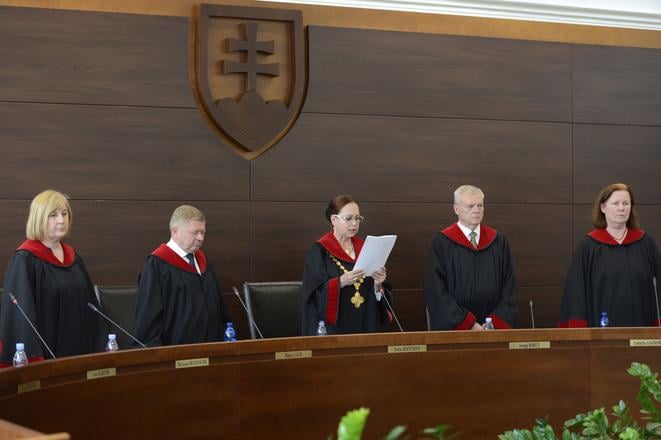Time is running for the ruling coalition to set up a better system to elect Constitutional Court judges before the big exchange of personnel at the court at the turn of the year.
The parliament will have to propose 18 candidates for the president to choose from to fill the nine seats that will become vacant at the Constitutional Court in February 2019. The term of the new judges will last for 12 years. There are altogether 13 judges in the Constitutional Court, which is established in Košice.
“This means that the majority of the Constitutional Court will change, which will decide until 2031 about the most important issues and conflicts regarding the constitution, fundamental rights, and rule of law principles,” stated the informal group of law experts, comprising some of the country’s most prominent lawyers and judges, which put together their own proposal on May 22.
Reluctance in the coalition
New rules for the election of Constitutional Court judges were the priority of former justice minister Lucia Žitňanská, who labeled the Constitutional Court the biggest issue of this election term in an interview with the Denník N daily on May 11.
“It is probably the biggest decision that this parliament will make, to elect the majority of the Constitutional Court judges for 12 years,” Žitňanská said, noting that she feels like Most-Híd is the only one among the coalition partners really putting it on the table. Žitňanská said she has sent the proposal to the SNS and Smer coalition partners repeatedly since the start of this year but have only shown "lukewarm interest" in it.
In fact, PM Peter Pellegrini visited the Court in Košice earlier this month and said that it is a point of discussion whether the election process needs any changes at all.
“It seems like the current legal definition seems to be quite sufficient,” he said.
Žitňanská’s successor in the post, Gábor Gál of Most-Híd, says that the talks with coalition partners have progressed and the parliament should adopt the change before the start of this summer.
Lawyers speak their minds
While the ruling coalition first was not clear whether the rules for the selection of Constitutional Court judges would really change, now the justice minister says talks are underway and the new law should be passed before the parliament’s summer break, to become effective before the nine new judges are to be selected.
In the meantime, lawyers from the third sector, academia, and law firms, came forward with their own idea of how the Constitutional Court judges should be chosen, stressing that the election of the new judges will be one of the most important events of 2018.



 Some judges of the Constitutional Court; illustrative stock photo (source: TASR)
Some judges of the Constitutional Court; illustrative stock photo (source: TASR)